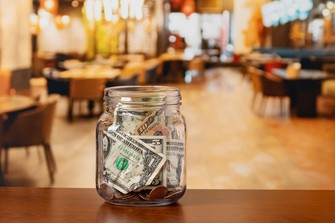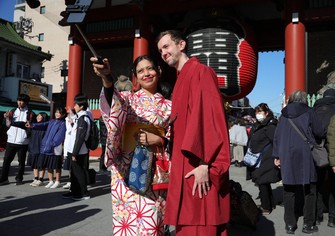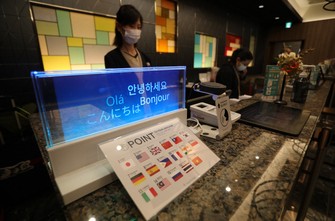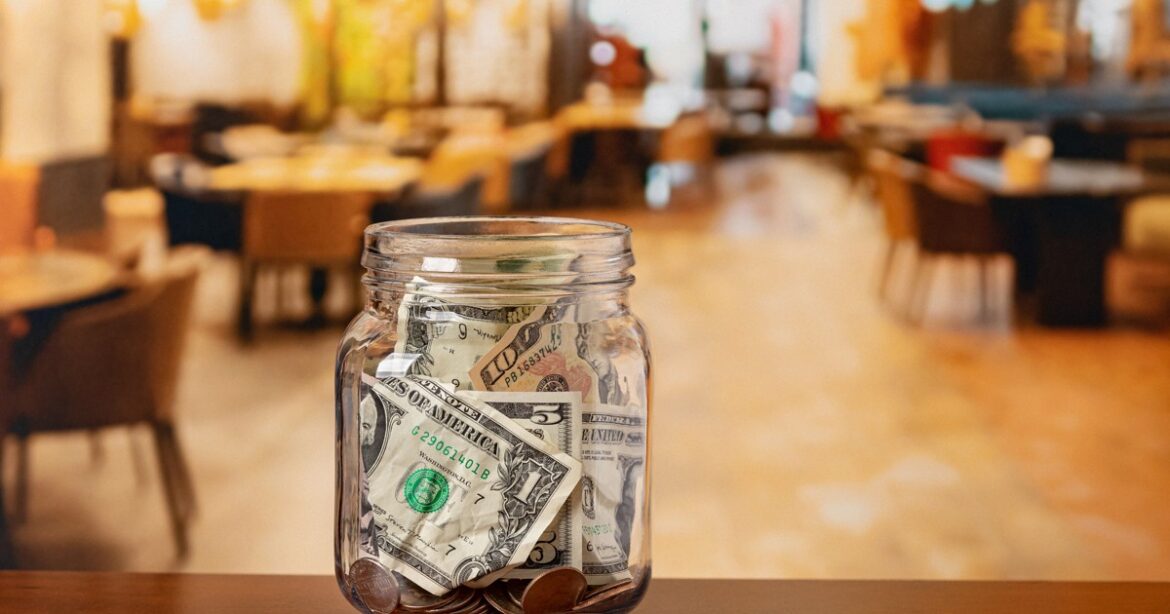
More stores in Japan are putting out tip jars or boxes. (Getty Images)
TOKYO — To tip or not to tip — that is the question on some people’s minds as Japan welcomes a surge of tourists against the backdrop of a weak yen.
The number of visitors to Japan set a first-half (January to June) record this year, topping the 20-million-mark to reach an estimated 21,518,100. The annual figure remains on track to top 40 million — an all-time high. Amid this influx, Japan has seen a quiet increase in “tip boxes.”
Is tipping accepted in Japan?
In some Western countries, it is normal for customers to tip at restaurants or in taxis, for example, but in Japan, the custom of tipping is rarely encountered. With Japan experiencing an unprecedented inbound tourism boom, will the tipping culture also spread?
In front of the Kaminarimon gate in Tokyo’s Asakusa area — a popular spot for foreign tourists — foreign visitors were busy taking commemorative photos with their smartphones and cameras. Along Nakamise-dori, a street lined with souvenir shops, stores were promoting themselves with signs in English, such as “Hand made by Japanese craftsmen,” while others had staff calling out in English, encouraging visitors to sample sweets.

Tourists visit the Kaminarimon gate in Tokyo’s Taito Ward in this file photo taken on Jan. 14, 2025. (Mainichi/Tsutomu Kobayashi)
One bar in Asakusa began placing a tip box next to the cash register about a year ago. This was because foreign customers had already been leaving tips, while there were also Japanese customers who would say “keep the change” and leave coins.
The bar owner in his 40s once had a foreign customer ask him, “Is it rude to tip in Japan?”
The owner says, “When people feel they’ve received value beyond the price of the food or service and express their gratitude with a tip, we welcome it. It’s fine either way if customers leave a tip or not.” He added that with the increase in foreign visitors, “More shops may start placing tip boxes.”
Keri, 47, who was visiting Asakusa from the western U.S. state of Oregon, commented, “I gave 1,000 to 2,000 yen (about $6.75 – $13,50) to the guides who showed us around Tokyo and Kyoto. They didn’t ask for it, but I wanted to express at least some sign of appreciation and respect.”
According to the Japan National Tourism Organization, the number of inbound foreign travelers to Japan reached a record 36.87 million in 2024. With the weak yen, spending by inbound tourists in Japan also increased, with total consumption rising 53.1% year-on-year to a little below 8.13 trillion yen (around $54.95 billion)
What surveys say about tipping
On the other hand, some Western countries do not have a tipping culture.
A 2023 survey by U.K.-based research firm YouGov PLC found that the percentage of people who said they usually tip restaurant waitstaff reached 78% in Germany, 77% in the U.S., 59% in the U.K., 47% in Spain, 37% in France, 34% in Sweden, 27% in Italy and 24% in Denmark — showing considerable variation.
As for the amount, most respondents in Europe said they tipped 5-10% of the bill, while in the U.S., over 60% said they tipped more than 10%.
Reasons for tipping varied. In the U.S., 56% said it was “rewarding good service,” 15% cited “social pressure,” and 24% said “the staff aren’t paid as much as they should be.”
Even in countries where tipping is common, many people seem to have mixed feelings about it. The tourist from Oregon who spoke to the Mainichi Shimbun said that in the U.S., people are expected to tip everywhere, but she gets tired of tipping at self-service restaurants where customers clear their own dishes. She added that Japan, where people don’t have to think about tipping, is easier.

A translation device equipped to handle several languages is seen at a hotel check-in counter in Tokyo’s Taito Ward on Jan. 14, 2025. When one speaks into the device the translated words appear on the screen. (Mainichi/Tsutomu Kobayashi)
What is the situation in Japan, then?
Eiko Kumagai, a former Japan Airlines flight attendant now teaching “hospitality” (omotenashi) at Kansai Gaidai University, says, “Japanese hospitality is rooted in respect, consideration and care for others. When people genuinely care for others, they naturally smile and act politely. Making others happy becomes their own joy. I imagine many people feel uncomfortable seeking something in return or attaching a price to that.”
In a survey Kumagai conducted with her students in June, 114, or 73%, answered “no” to the question, “Do you think Japan should have a tipping culture?” When asked if they thought tipping would become established in Japan in the future, 141 students, or 91%, said “no.”
In the free comment section, many expressed negative views about tipping, such as, “When I studied in Canada, I was always unsure how much to tip,” “I’d rather be paid by the company for my work than receive tips,” and, “It seems like a hassle.”
Kumagai speculates, “The American style of tipping probably doesn’t fit Japanese culture. Even if some shops in tourist-heavy cities start accepting tips from foreign customers, I don’t think Japanese people will start tipping like foreigners do.”
The surging wave of inbound tourists does not seem to have reached the point of overturning cultural attitudes toward tipping that have seeped deeply into the island nation of Japan.
(Japanese original by Tamami Kawakami, Digital News Group)


AloJapan.com